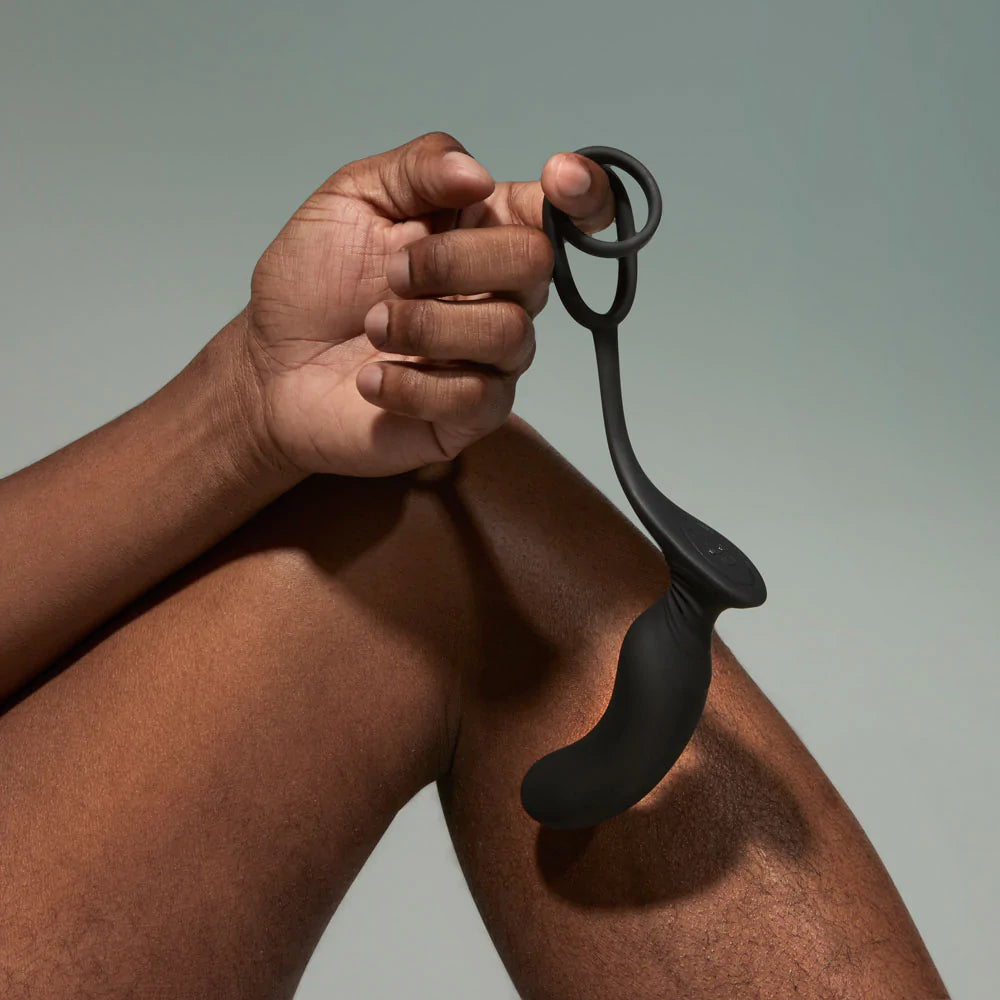Get our Beginner's Guide to Prostate Massage and 15% off your order.

Testosterone and Prostate Cancer: How Are They Linked?
Taking care of your prostate is integral to your overall health and quality of life, even though you can’t see your prostate with your naked eye. Routine prostate exams don’t start until 50, so arming yourself with knowledge is essential.
For instance, is there a link between testosterone and prostate cancer? What can you do to keep your prostate healthy? We’ve got the answers you need.
What Is the Prostate?

Let’s start with some prostate basics.
If you were assigned male at birth, your prostate is the walnut-sized gland located below your bladder and in front of your rectum. You probably don’t pay much attention to it when it's working normally, but that doesn’t mean it’s not constantly working undercover to keep your reproductive system going.
For example, the prostate produces a fluid that makes up about 30 percent of the composition of semen. The prostate muscles are also stronger than you’d think, helping propel semen into the urethra and out of the body. The process and composition of ejaculation would be far less robust without the prostate.
Unfortunately, there really is no foolproof way of being able to tell if your prostate is healthy other than taking a trip to your doctor. In addition to having yearly prostate exams once you qualify, many providers will run a screening blood test known as a PSA (prostate-specific antigen) test. PSA levels can help tell the difference between a healthy prostate and one that may risk prostate cancer.
What About the “P-Spot”?

The prostate is also known as the “P-spot,” an erogenous zone for people with a prostate. When you’re turned on, the prostate starts to swell with fluid. Varying degrees of pressure on that aroused, swollen prostate can be intensely pleasurable for many people.
Prostate massage is for anyone open to giving it a try, no matter your sexuality. You can apply pressure externally or internally, by yourself or with a partner.
You can also use a prostate-specific toy, as long as you use plenty of lubrication. The result is often game-changing and intense orgasms, which have been called “ecstatic” and “exceptionally pleasurable.”
Who wouldn’t want that? We recommend trying it at least once before ruling it out.
What Is Testosterone and Why Is It So Important?
Testosterone is a lot of things, but at its most basic level, it is a sex hormone. Technically, testosterone is considered an androgen — a traditionally “male” sex hormone.
Although it’s often associated with more “masculine” features (like facial hair and a deep voice), everyone has at least a small amount of natural testosterone in their body along with androgen receptors. In fact, testosterone is also converted to a form of estrogen called estradiol.
While testosterone is primarily a sex hormone, it has other, equally important biochemical roles too! For instance, testosterone is also responsible for supporting muscle mass and bone strength, supporting the production of red blood cells, and maintaining healthy sexual function and drive (libido).
Testosterone may also impact the mood, but not in the way you may think! Instead of high levels of testosterone leading to aggression, low concentrations of testosterone may actually contribute to depressive symptoms.
Interestingly enough, the body actually needs cholesterol to produce testosterone. However, that doesn’t mean you need high cholesterol to have adequate free testosterone. Cholesterol is an essential piece of the puzzle, but the control center is a pea-sized gland in the brain known as the pituitary.
Are Testosterone and Prostate Cancer Linked?

Testosterone is a normal part of life for people with a prostate. But is there a link between testosterone and prostate cancer cells? Should older men be worried if they haven’t been taking care of their prostate?
Researchers have been looking for that link since the 1940s. Initially, scientists believed high testosterone levels actually contributed to prostate cancer growth and progression.
This would require androgen deprivation therapy. However, more recent clinical trials have flipped that theory on its head, showing a higher risk of prostate cancer in those with low testosterone levels or a testosterone deficiency.
A lot of the confusion comes from the fact that a slightly different version of testosterone (dihydrotestosterone, or DHT) can make the prostate larger. However, it hasn’t explicitly been linked to cancer.
So what can you take from that? The unclear connection between testosterone and prostate cancer can be stressful, especially for people who suffer from medical conditions requiring testosterone replacement therapy (hormone therapy) and supplementation (like hypogonadism).
For people with lower testosterone levels, it can feel like a choice between living with a reduced sex drive and erectile dysfunction (potential side effects) or being at high risk for prostate cancer. It doesn’t sound like a fair choice, does it?
The good news is that, while science is constantly changing, there isn’t enough conclusive research to prove any connection between testosterone and prostate cancer. However, if you’re concerned, talk to your healthcare team about your specific risk factors. You may even consider a urology specialist, who can advise on reproductive health for people AMAB.
What Causes Prostate Cancer?
Like any part of the body, the prostate can turn cancerous — an advanced prostate cancer called castration-resistant prostate cancer is just one risk if initial prostate cancer treatments like radiation therapy aren’t successful.
Although there is currently no clear link between testosterone and prostate cancer, a few other factors may increase your risk of developing it in the future.
Unfortunately, not all of them can be controlled or changed. Still, awareness of what may put you at either high or low risk can help you be more proactive with your health.
- Age. You can’t control your age. However, older people with prostates tend to have a high incidence of metastatic prostate cancer. The average age of a person with a new prostate cancer diagnosis is 67. That’s why active surveillance of the prostate starts at 50 for people without a family history.
- Family history. Like many other cancers, prostate cancer tends to run in families. Having one close relative with prostate cancer puts you at twice the increased risk (whether it’s aggressive prostate cancer or not). That doesn’t mean that people without a family history are in the clear, though. According to the American Cancer Society, most prostate cancers are diagnosed in those with no family history. Other genetic mutations that can be passed down, like some of the BRCA genes, can increase your risk.
- Race. Like your age, another prostate cancer risk factor out of your control is your race. Black people with prostates have the highest prostate cancer rates and tend to be younger when diagnosed, but the reason has yet to be discovered.
- Diet. The foods you choose to eat can also impact your prostate cancer risk. A diet full of processed, high-carb, high-fat foods and dairy products can increase your risk for various health-related issues, including cancer.
Reducing Your Risk

Just because some prostate cancer risk factors are out of your hands doesn’t mean there aren’t ways to keep your prostate as healthy as possible.
Maintaining a healthy weight is one of the best ways to keep your entire body functioning optimally. Stay physically active (pro tip: this can also help with sexual function and performance), follow a healthy diet full of fresh fruits and vegetables and whole grains, and cut out as much sugar, red meat, and dairy as possible.
In addition, why not perform a little self-exam the next time you explore your P-spot? Regular P-spot massage is not only pleasurable but also offers you a way to establish your prostate’s “normal” baseline.
Your prostate should feel soft and rubbery without any noticeably hard or firm nodules. If you or your partner feel anything out of the ordinary, follow up with your doctor for screening tests — these can include digital rectal exams, PSA blood tests, or a biopsy.
To Summarize
While the connection between testosterone and prostate cancer is still hazy, maintaining the health of your prostate is crucial. Regular check-ups with your doctor and reporting anything out of the ordinary you or your partner may notice during prostate stimulation are essential.
If you’re interested in exploring your P-spot a little more, be kind to your behind and check out our short quiz to help you find which award-winning prostate massager is right for you.
Sources:
How does the prostate work? | NCBI Bookshelf
Testosterone — What It Does And Doesn't Do | Harvard Health
Androgen Physiology, Pharmacology, Use and Misuse | NCBI Bookshelf
Prostate-Specific Antigen (PSA) Test | NCI
Cancer Stat Facts: Prostate Cancer | National Cancer Institute










